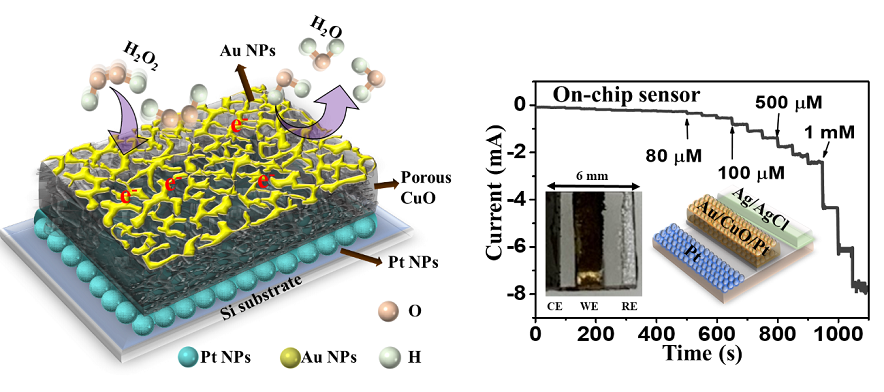Advancing Hydrogen Peroxide Detection with Ultra-Sensitive Sensor
- admin
- 2023-09-26
- 1668
(Department of Electronics Engineering) Develops
Ultra-Sensitive Hydrogen Peroxide Detection Sensor Based on 3D Porous Au/CuO/Pt
Hybrid Electrode
- Developed a 3D Porous Au/CuO/Pt Hybrid
Platform Electrode
to Overcome the shortcomings of Enzymatic
Hydrogen Peroxide Detection Sensor -
- Developed a 3-Electrode On-Chip Biosensor
Kit,
Demonstrating 25,836 μA mM-1cm-2 Ultra-High
Sensitivity and
30-Hour Continuous Stability -
- Published in Sensors and Actuators B: Chemical,

(Left) Doctoral
Researcher, Rutuja Mandavkar, (Right) Professor Jihoon Lee
The
research team of Professor Jihoon Lee (Dept. of Electronic Engineering), in
collaboration with Rutuja Mandavkar (the first author), a doctoral researcher,
successfully developed an
ultra-sensitive hydrogen peroxide (H2O2) detection sensor using a 3D porous
Au/CuO/Pt hybrid framework. In this research, the team proposed a 3D porous
Au/CuO/Pt hybrid sensor platform to overcome the shortcomings of non-enzymatic
hydrogen peroxide detection sensors and succeeded in developing the Au/CuO/Pt
hybrid sensor and a 3-electrode on-chip biosensor kit.

The
research team included Rutuja Mandavkar (doctoral researcher, first author),
Shusen Lin (integrated master's and Ph.D. program), Md Ahasan Habib (doctoral researcher),
Shalmali Burse (doctoral researcher), Mehedi Hasan Joni (integrated master's
and Ph.D. program), Sundar Kunwar (doctoral researcher), Jae-Hun Jeong
(research professor, corresponding author), Jihoon Lee (professor,
corresponding author), Adel Najar (United Arab Emirates University), and S. Assa
Aravindh (University of Oulu, Finland, corresponding author) in an
international collaborative research effort. Rutuja Mandavkar, the
first author, entered the electronic engineering Ph.D. program at the
university in 2020 and has since published numerous papers as a first-author or
co-author. She is about to graduate. The
researcher, Rutuja is happy that her research on hydrogen oxide detection
sensors has been published in an excellent journal, and she expresses her
aspiration to continue her research at a prestigious research institute after
graduation.
This
research was supported by the Brain Korea 21 Plus (BK-21) program, a key
research project, and Kwangwoon University and the research findings were
published in the online edition of scientific journal Sensors and Actuators B:
Chemical (JCR category INSTRUMENTS & INSTRUMENTATION, ranked 1st, IF: 8.4)
in the August 2023 under the title "Ultra-sensitive H2O2 sensing with 3-D
porous Au/CuO/Pt hybrid framework."
Weblink: https://doi.org/10.1016/j.snb.2023.134512